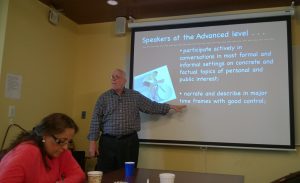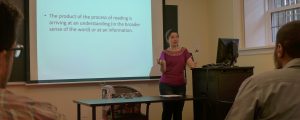Four days of intensive training averaging about eight hours a day, took me and a dedicated group of eleven other members of language faculty here at Yale on a journey to explore the wonders of the world of the OPI. And though this world is no secret to any active language instructor, it is indeed mysterious and enthralling.
Many know the ACTFL Oral Proficiency Interview (OPI) as a standardized test for speaking ability; they also know that this very short definition is one tenth of the iceberg and there is nothing short of nine other tenths that lie under the surface. During our expedition that took place in the Center of Language Studies on campus, our guide, Alice Miano aided by our Testing and Assessment Specialist, Mary Jo Lubrano, led the journey starting from the criteria underlying this test, and continuing on to its reliability and enormous applicability. We experienced firsthand the interactive, adaptive and speaker-centered nature of this test that not only give it power as an assessment tool, but also make it challenging for testers in terms of extracting a ratable sample as well as following the rating protocol.
In the final day of training, a glimpse of light was shone on our path as teachers when a number of best teaching practices – springing from the OPI – were presented to us. One of these was the stages of the test (a warm up, an escalating interactive phase and a wind down) and the way these stages could be used as phases of instruction inside the class.
I was feeling so excited about what I had learned, thinking “Woo! I have learned so much about the OPI!” when the keynote speaker of the spring conference of the New York Arabic Teachers’ Council showed me that – actually – there is still more. Going to NYC only one day after our training session was over; I went with the mentality of a presenter, rehearsing on the Metro North my presentation that addresses the subject of effective means to assess reading comprehension. I was looking forward to sharing with my colleagues a combination of experience and education that I had picked up as an active language instructor and as a graduate student in the field. I was equally looking forward to listening to the keynote speech with hopes to further widen my view of world of language testing. In a little less than two and a half hours, Greg Duncan opened a new door to meaningful assessment trying to answer the questions of knowing what to assess in our classes, as well as deciding the best use of the data that we get from these assessments in an effort to help our students learn and continue learning language. He effectively created a swift transition from this rigorous test of the OPI to classroom tests (across all three modes of communication: interpersonal, interpretative and presentational) following the 5 Cs (Standards for Foreign Language Learning, Preparing for the 21st Century).
Needless to say, it was a very exciting week, filled with dense insightful and perceptive implementations to the worlds of language teaching and testing. I feel privileged to have been a part of this substantial transition of information and thankful to my colleagues and all the professionals that made it possible.


